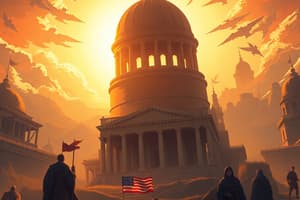Podcast
Questions and Answers
What is sovereignty?
What is sovereignty?
Supreme power or authority
What is anarchy?
What is anarchy?
A lack of government and law
What characterizes a democracy/republic?
What characterizes a democracy/republic?
Government ruled by the people
What is an aristocracy/oligarchy?
What is an aristocracy/oligarchy?
Define authoritarian/totalitarian government.
Define authoritarian/totalitarian government.
What is a constitutional democracy?
What is a constitutional democracy?
What is fascism?
What is fascism?
What does a theocracy entail?
What does a theocracy entail?
What was the Enlightenment?
What was the Enlightenment?
Define humanism.
Define humanism.
What does secular mean?
What does secular mean?
What is liberty?
What is liberty?
What are individual rights/civil rights/inalienable rights?
What are individual rights/civil rights/inalienable rights?
What is the separation of powers?
What is the separation of powers?
What is voter suppression?
What is voter suppression?
What is the Magna Carta?
What is the Magna Carta?
What does the rule of law signify?
What does the rule of law signify?
What is an ideology?
What is an ideology?
What is a revolution?
What is a revolution?
Define coup d'etat.
Define coup d'etat.
Flashcards are hidden until you start studying
Study Notes
Sovereignty
- Supreme power or authority in a state or independent entity.
Anarchy
- A state of disorder due to the absence or breakdown of government and law.
Democracy/Republic
- Government ruled by the people, either directly or through elected representatives.
- Republics are representative democracies with a constitution that protects individual rights.
Aristocracy/Oligarchy
- A government ruled by a small, privileged group of people, often based on wealth, birth, or social status.
- Aristocracy generally refers to rule by nobility, while oligarchy refers to rule by a select few with power.
Authoritarian/Totalitarian Government
- A government where one leader holds absolute power and controls all aspects of a nation's resources and life.
- Often characterized by suppression of opposition and limited individual freedoms.
Constitutional Democracy
- A government that operates within the framework of a constitution, limiting the power of those who govern and ensuring the voice of the people is heard.
- Constitutions establish fundamental rights and principles that cannot be easily changed.
Fascism
- An extreme political ideology characterized by nationalism, racism, a strong central leader, and suppression of opposition.
- Fascist regimes often seek to control all aspects of society, including the economy and culture.
Theocracy
- A government where religious leaders hold political power, often based on divine authority.
- Religious law and principles are central to governance in a theocracy.
Enlightenment
- A period in the 1700s that emphasized reason, science, and individual liberty.
- Thinkers like Locke, Rousseau, and Montesquieu challenged traditional authority and advocated for a separation of powers and individual rights.
Humanism
- A philosophy that emphasizes human potential and creativity, often placing importance on individual worth and moral responsibility.
- Humanists tend to focus on the here and now, seeking to improve human life and society.
Secular
- Not based on or related to religion, but a separation of church and state.
- Secular governments treat all religions equally.
Liberty
- Freedom with responsibilities as a citizen.
- Individuals have the right to express their views and participate in society, but must adhere to established laws.
Individual Rights/ Civil Rights/ Inalienable Rights
- Basic liberties and rights guaranteed to all citizens, usually enshrined in a constitution or charter of rights.
- Examples include freedom of speech, religion, assembly, and the right to a fair trial.
Separation of powers/ System of Checks and Balances
- Dividing government power between the legislative, executive, and judicial branches.
- Each branch has its own responsibilities and can check the power of the others, preventing any one branch from becoming too dominant.
Voter Suppression
- Any action taken by the government that hinders or restricts people from voting, often targeting specific populations.
- This can involve limiting voting access, changing election laws, or intimidating voters.
Magna Carta
- A landmark document signed by King John in 1215, establishing principles of limited government and individual rights.
- It influenced later declarations of rights and constitutionalism by guaranteeing certain freedoms and limiting the king’s power.
Rule of Law
- The principle that everyone, including those who govern, is subject to the same laws and legal processes.
- This ensures fairness, predictability, and accountability in society.
Ideology
- A system of ideas and beliefs that forms the basis of economic and political theory and policy.
- Ideologies provide a framework for understanding the world and shaping social, economic, and political actions.
Revolution
- A fundamental and often violent overthrow of a government or social order, leading to significant changes in power and structure.
- Revolutions occur when there is widespread dissatisfaction with the existing system.
Coup d'état
- A swift and forceful seizure of power by a small group, often involving military or political elites.
- Coup d'états often involve the removal or incapacitation of the existing leadership.
Studying That Suits You
Use AI to generate personalized quizzes and flashcards to suit your learning preferences.




